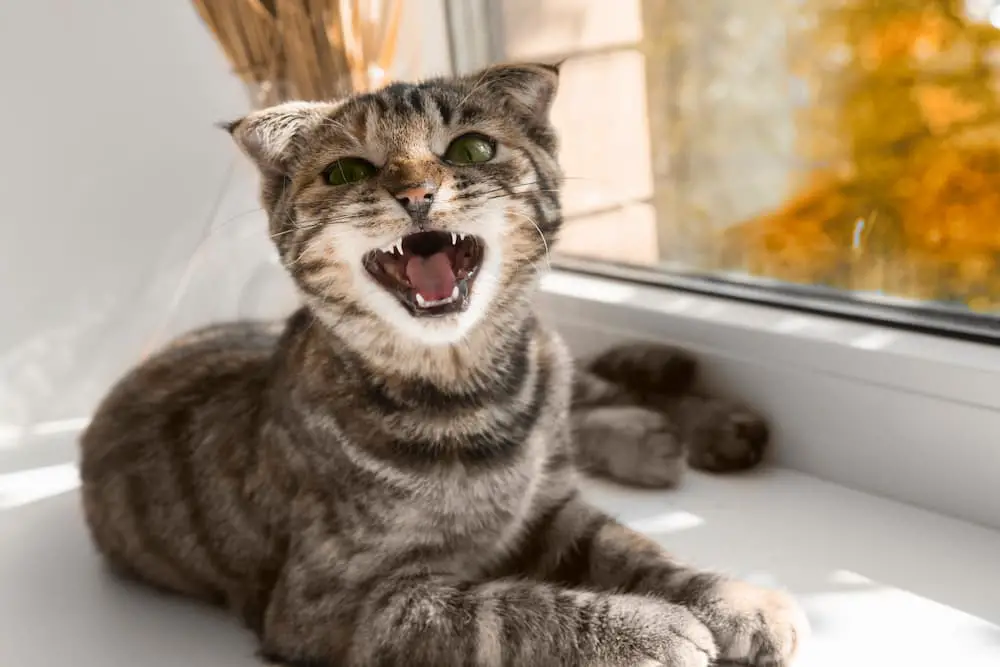We love our cats, but there are some common issues cat parents face that can be quite frustrating. These include jumping onto counters, going into areas they’re not allowed, exhibiting inappropriate elimination, or spraying around the house. Fortunately, there are many ways to resolve these common cat problems.
Keeping Cats Off The Counter

Is your cat forever jumping up on the kitchen counter? Sure, a lot of people have simply decided to “live with it” and let their cats go anywhere they want. But, it’s a good idea to break your cat of this habit. After all, they do spend a good amount of time digging around in the litter box. Do you really want those same paws on the counter where you prepare your food?
Cats also might try to steal food from the counter. That’s messy and often unhealthy for your feline friend. And, let’s not ignore the serious risk of a cat jumping onto a hot stove!
So, how do you combat your furriest friend’s counter surfing? First, understand why they do it.

Cats need to feel as if they’re in control of their environment and they generally enjoy being up high where they can lord over their subjects. If your cat is climbing on counters, the best option is to build an appropriate area that allows him to climb. Cat trees are wonderful for this, but there are also cat shelves that can be placed on a wall (especially great if you’re low on space).
Reward your cat for using the cat tree or cat shelf to positively reinforce that behavior. When you find your cat on the counter, move your cat to his or her new appropriate spot, and give a reward.
At the same time, you can try products that will make the counter less appealing to your cat. Products like Ssscat! are motion-activated and spray a stream of air, making a loud “hissing” sound. These are great options because they work to train your cat even when you aren’t home to police your cat.
Inappropriate Elimination or Spraying

Over 43% of people who relinquish their cats to shelters do so because of problems with inappropriate elimination, according to a report from the National Council on Pet Population Study and Policy.
Cats that spray or defecate outside of their box are a big problem, but sometimes it’s simple to resolve.
The very first thing to do is take your cat into the veterinarian for a checkup. Most cats engage in inappropriate elimination due to a physical problem, such as urinary tract infections. But, if the vet rules out a medical reason, it’s time to consider other options.
If your cat is spraying, it could be something as simple as the litter box is dirty or was occupied by another cat. Cats can be very finicky about where they potty, and some require a box that is always clean. Consider adding another litter box to your home. This is especially important if you have more than one cat. The usual rule is that each cat needs its own litter box, plus one more. For instance, if you have three cats, you would need four boxes. This presents options for each cat and reduces the chance of spraying for territory.
Consider purchasing an automatic litter box. These are very popular with cat owners as they automatically clean a cat’s box after each use.
Litter Kwitter may be one way you can avoid cleaning litter boxes forever. This unique system helps train your cat to use the toilet instead of the litter box. In some cases, you may even be able to train your cat to flush!
Litter Genie is another great tool for cat owners. This box locks odor away after you’ve cleaned it from the box and helps decrease the number of trips you need to make to the garbage can. Place next to your box and dump waste. The Litter Genie helps lock away odors that you – and your cat – find offensive.
Never Punish Your Cat

While cats are usually perfect pets, they can sometimes do things their human companions find extremely frustrating. With that said, if you find yourself upset over something your feline friend has done – whether she’s jumped on the counter, knocked over an irreplaceable family heirloom, urinated on your sofa, or scratched your new area rug – don’t ever use punishment as a training tool!
First, cats don’t learn this way. They don’t make the connection that their behavior is the reason they’re being punished. Second, punishing a cat only serves to create fear and diminish your relationship with your cat. Cats learn through positive reinforcement. So, instead of punishing bad behavior, reward wanted behaviors to strengthen the bond you have with your furry friend.
Start your search for all the products to help you prevent and solve problem behavior in cats by clicking here.
Save this for later… Pin it!








